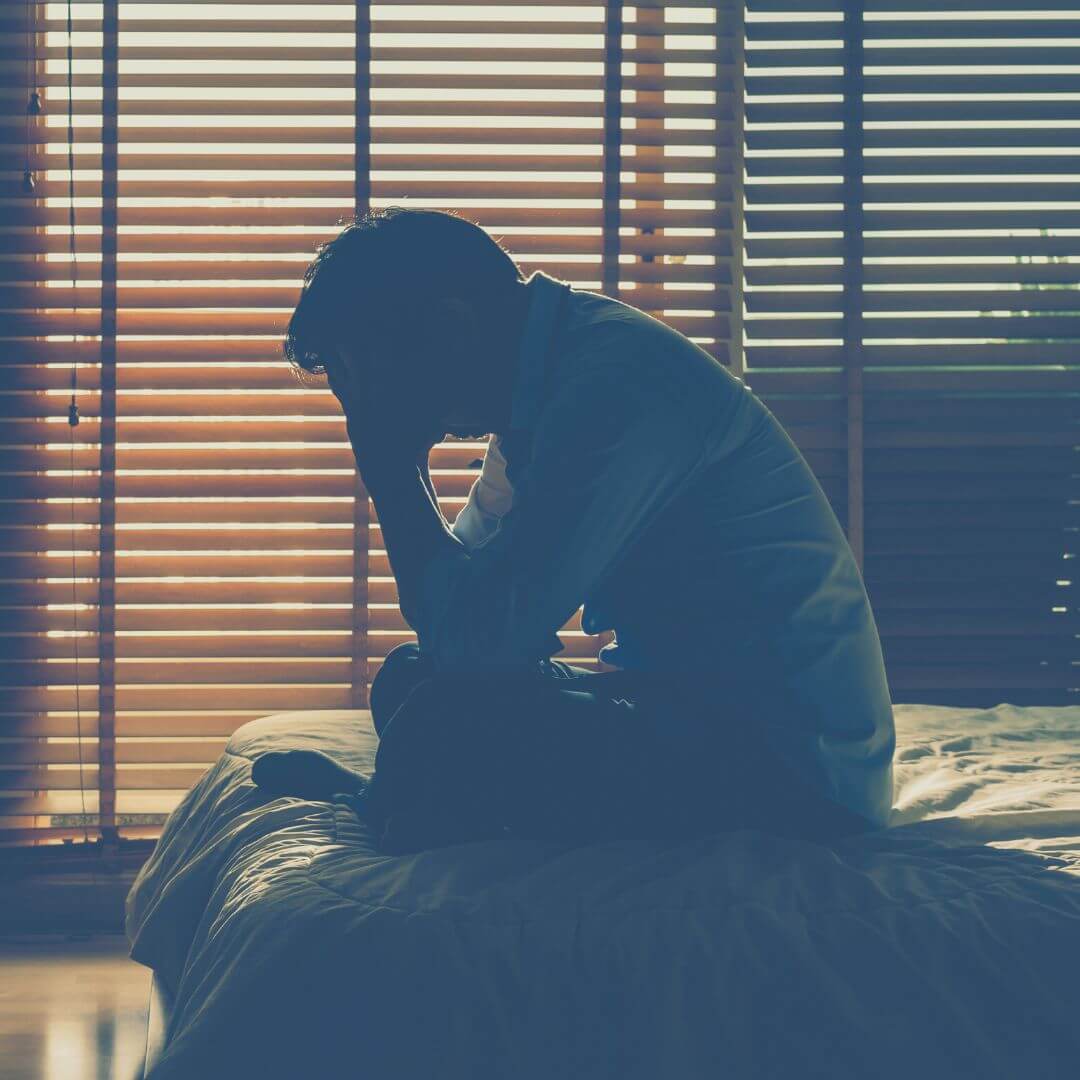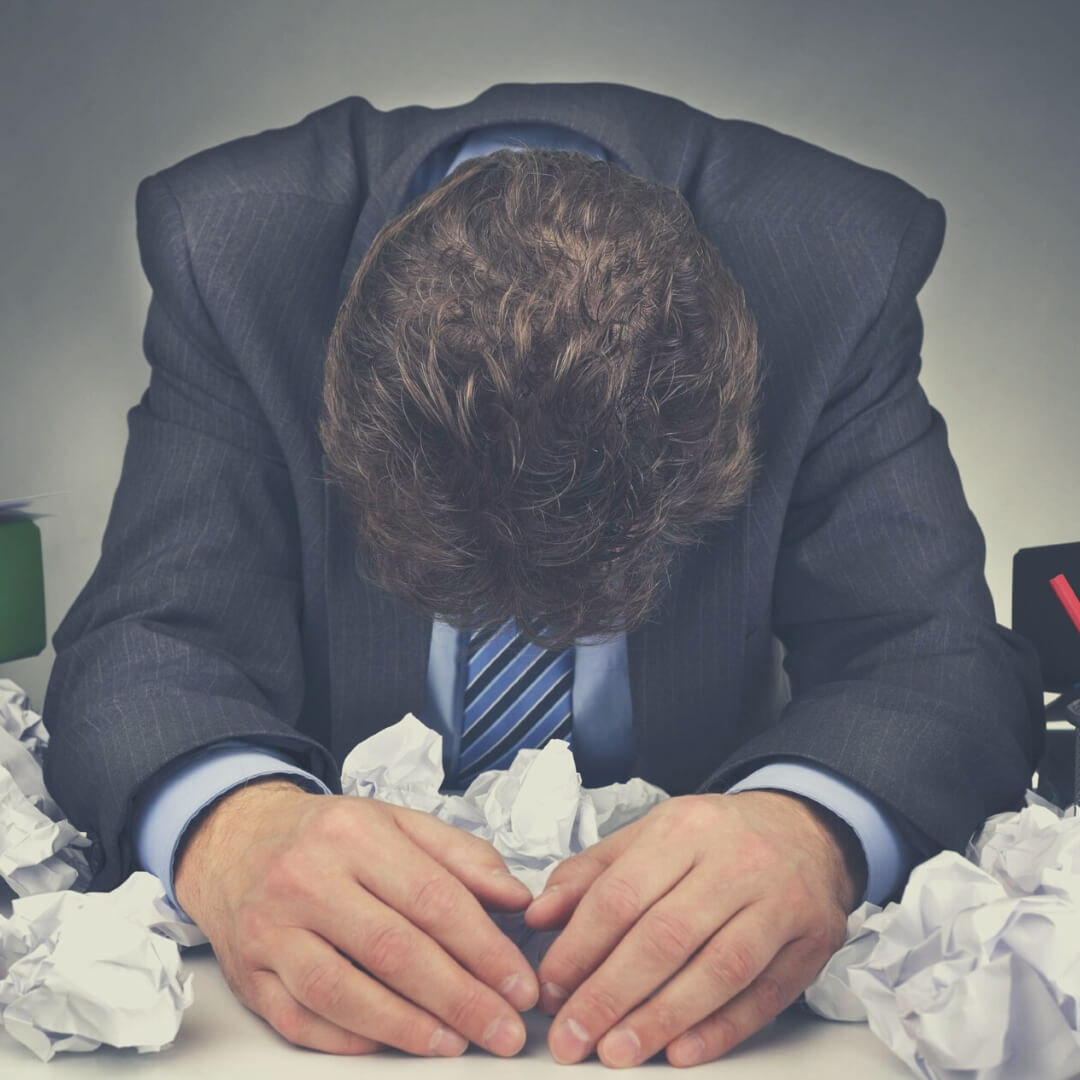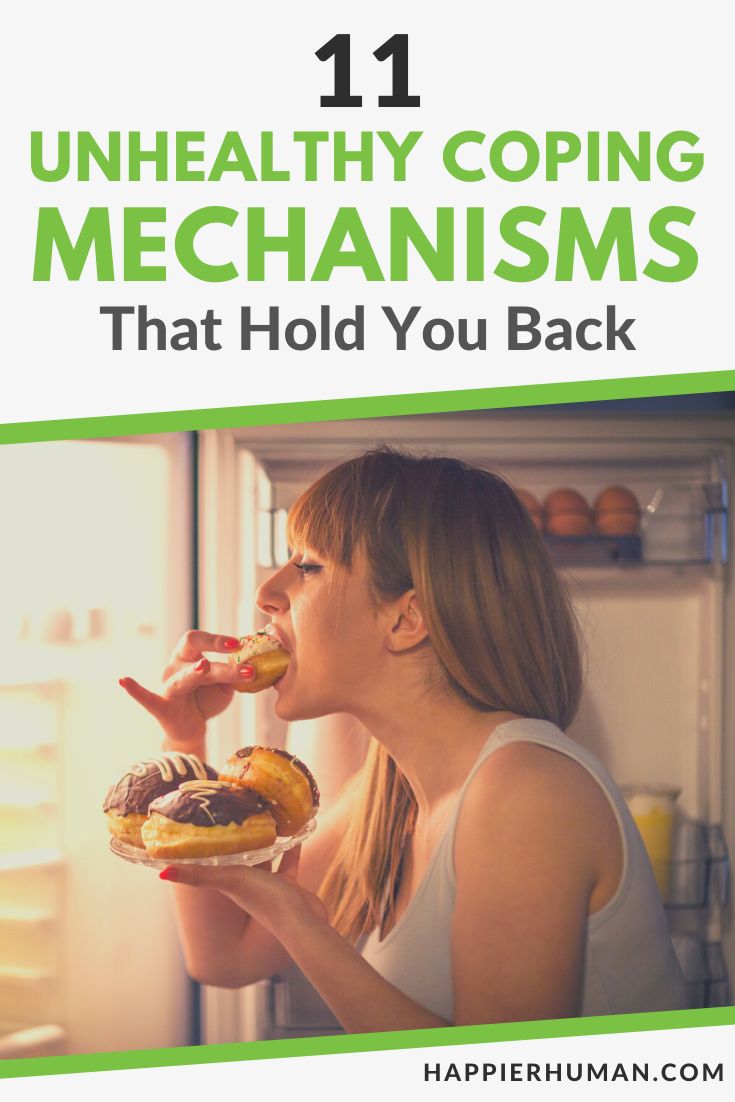Adulthood is plagued with what sometimes feels like endless challenges. As fast as you solve one, another one pops up.
How we cope with life stressors and adversities can make a difference in things getting better or worse. As such, it's crucial to have coping skills and strategies that improve your circumstances without eroding your well-being.
Practically any type of unhealthy coping strategy is going to backfire or cause more problems instead of helping. I've shortlisted seven unhealthy coping mechanisms you need to know about, particularly because they can prevent you from living a happy and productive life.
The goal is to help prevent or stop you from relying on them to escape your problems. I've also provided a list of healthy ways to cope with discomforting emotions and manage stress from everyday life.
What are Coping Mechanisms?
The American Psychological Association (APA) defines coping mechanisms as “any conscious or nonconscious adjustment or adaptation that decreases tension and anxiety in a stressful experience or situation.”
Susan Folkman and Richard Lazarus define coping as “constantly changing cognitive and behavioral efforts to manage specific external and/or internal demands that are appraised as taxing.”
In simple terms, humans cope using thoughts and behaviors to manage any situation that is stressful or perceived as stressful.
For example, chronic illnesses, mental disorders, grief, loss, or doing something they fear. Thoughts and behaviors for coping aren't always healthy (adaptive).
Further, coping is both a reactive response and a proactive step taken to reduce the effects of the stressor. For some psychologists, unhealthy (maladaptive) coping isn't coping at all, since the person fails to solve the stressful situation.
Types of Coping Mechanisms
People also engage in different types of coping. Psychologists managed to narrow them down to four main groups or categories, as listed below. After going over the types, you may get an idea of how you cope with stress and challenges.
By and large, these are considered healthy coping mechanisms mainly because they involve tolerating, adapting to, and managing the effects of distress. Managing, instead of running away from the source of distress (avoidance strategy), helps you to feel better.
Notably, a person's choice of coping strategies usually varies based on the level of psychological distress they're experiencing at the time. According to the Journal of Affective Disorders Report, healthy coping strategies may not work in cases of overwhelming distress. Furthermore, while some unhealthy approaches may cause mild harm, others cause severe harm.
Differences Between Healthy vs Unhealthy Coping Mechanisms
Healthy coping is proactively taking steps to address stressful emotions or experiences in a way that protects your well-being. Unhealthy coping involves thinking of or doing things that have negative physical, psychological, or emotional consequences.
The solution can appear gratifying at the moment but typically creates additional problems. For example, putting off work to avoid the discomforting feelings of anxiety associated with the task.

On the other hand, healthy strategies often lead to long-term positive outcomes. Reframing, positive self-talk and deep breathing exercises are examples of ways to deal with anxiety, instead of procrastinating.
11 Unhealthy Coping Mechanisms that Do Harm
To recap, coping strategies can be cognitive (thoughts) or behavioral (actions), but not all of them help you reduce or relieve stress, solve problems, and deal with uncomfortable emotions.
Consciously or unconsciously engaging in any of the following ways of overcoming problems is considered maladaptive or harmful.
#1. Isolation
Isolation, sometimes called social withdrawal, is a common and easy way to try and manage distress. It's regarded as harmful because it often equates to avoiding the problem or overwhelming feelings.
At first, it may seem to help, especially if you're using distraction methods such as binge-watching TV or scrolling through social media for hours.
You may feel a sense of relief initially. As time passes, isolation can begin affecting your mental health. Isolation has been linked to loneliness, anxiety, poor sleep, depression, and suicidal thoughts. That's because humans are hardwired for social connection.
Meanwhile, some problems don't just disappear if you hide from them. You have to come out of hiding and confront your situation or feelings, process them, and plan ways to get past them. I understand that they might be frightening, but you're stronger than you think. You can do this.
#2. Substance abuse
Alcohol and drugs are common substances people use to self-medicate and escape negative thoughts and feelings. It'll feel like it's soothing emotional pain, but the relief is only temporary. You might end up feeling worse once the effects wear off. Your problems will still be there facing you the next day.
Not only that. Excessive alcohol consumption or drug abuse is a destructive way of managing life problems, primarily because it can lead to addiction. What might start out as one drink or one smoke can turn into habitual substance use.
These substances activate the dopamine reward circuit in the brain and cause you to crave more. Other proven consequences of substance abuse include physical and mental illnesses, including depression. On the far end, substance use can lead to overdose and death.
#3. Overeating (or undereating)
According to the American Psychological Association (APA), stress is a top reason why many people engage in unhealthy eating behaviors.
Overeating, also called emotional eating, means eating more than is required for daily sustenance. For some individuals, it's a quick and easy way to numb away pain and distress.
Feeding the body with food is a rather rewarding activity for the brain. In fact, it creates euphoria the same way alcohol and drugs do. You may take it up a notch and eat lots of food in one sitting, also called binge eating.
Self-medicating with food is a harmful coping behavior. Overeating or binge eating results in excess fat storage in the body, which can lead to weight gain, obesity, and diabetes. Obesity can cause low self-esteem, which can lead back to more overeating or a binge eating disorder.
Emotional undereating is just as bad. Eating less food than needed daily disrupts your metabolism and causes chronic low blood sugar and malnutrition. Not eating enough can result in other adverse effects including irritability, restlessness, trouble focusing, and depressed mood.
#4. Overthinking
Thinking is a necessary process to get clarity, understand, and make decisions for sorting out difficulties. Overthinking isn't. Thinking too much is considered a defensive coping mechanism to protect against painful or upsetting thoughts or unpleasant situations.
According to psychodynamic psychotherapist Joshua Miles, overthinking is “An unconscious psychological mechanism which operates to reduce anxiety occurring from experiences or stimuli that might be harmful or unacceptable.” Incidentally, the more you overthink, the more you feel anxious.
Many people unconsciously spiral into racing thoughts that may spill over to catastrophic thinking or catastrophizing. Catastrophizing is when you magnify little issues and expect the worst outcome.
Finding ways to calm your mind, such as deep breathing exercises or meditation, are helpful in avoiding the consequences of overthinking and catastrophizing.
#5. Overspending/impulsive spending
Overspending, also known as retail therapy, is buying more than is necessary to meet your personal needs and occasional indulgences. It's often done impulsively to avoid dealing with stress.
I'm guilty of going on shopping sprees, for weeks, to soothe negative emotions, so you're not alone. The last time I caved to this unhealthy coping strategy was when my grandmother died, this year, on my birthday!

Indeed, retail shopping reduces sadness, improves your outlook on life, and boosts your mood. It cheers you up and is quite therapeutic, according to one study, even though temporarily.
As exhilarating as it feels, coping this way isn't good for your pocket or your well-being. Not only that, the tendency demonstrates a lack of self-control. Besides, the issues will be waiting for you when you return home with bags and bags of unnecessary stuff.
#6. Toxic positivity
Optimism and maintaining a positive mindset are good strategies for your mental well-being. However, excessive positivity comes at a cost. It's actually toxic because life is, in fact, filled with problems and negativity.
Toxic positivity is telling yourself everything is alright no matter how difficult a situation is. This type of positive thinking is unhealthy because it involves denying and minimizing real and valid negative emotions. While you may maintain good vibes or a cheerful face, it's only a facade.
The coping style prevents you from experiencing genuine negative emotions, such as anger, fear, and sadness. In the normal scheme of things, feeling those emotions might motivate you to self-soothe or seek support from friends and loved ones. Instead, those emotions are ignored, dismissed, or invalidated.
In short, toxic positivity is an avoidance mechanism that causes you to hide authentic human emotion necessary to be felt as a part of finding lasting solutions to challenges.
#7. Self-injury
Self-harm or self-injury is anything you do to purposely hurt yourself. According to Rethink Mental Illness, self-harm isn't a mental illness, but a sign of severe psychological distress or an underlying mental disorder.
People usually self-harm as a way to escape painful emotions. Cutting, burning, scratching, and hitting oneself are common types of self-harm behaviors. An individual may do these things, not to attempt suicide, but to “feel” something at times when they're experiencing emotional numbness. These methods are also used to self-punish.
Needless to say, self-harm is a counterintuitive and dangerous form of emotional escape for anyone, and can turn fatal.
Identify overwhelming emotions that trigger the desire to self-harm and think of healthy alternative ways to process those emotions. For example, talking to a trusted friend or someone at Crisis Text Line.
If you notice a family member or loved one with signs of self-harm, try to get medical help right away or call the National Suicide Prevention Lifeline at 800-273-8255. Signs include fresh cuts, scratches, burns, or bruises.
8. Catastrophic Thinking
One unhealthy coping mechanism you may have is called catastrophic thinking. It’s when you jump to conclusions and focus on disastrous thinking, predicting the outcome of a situation and acting to preempt the threat before it can affect you.
Your mind jumps to the worst-case scenarios that are most often irrational, making you feel anxious.
For example, you call your romantic partner a few times to share exciting news, but they don’t answer your calls. You think they must be cheating on you because they’ve been acting secretive lately, so you break up with them that night. Meanwhile, they were busy with work or even arranging a secret party for you.
Of course, catastrophizing also means you may not act (which is an action in itself). In this scenario, you may want to apply for a promotion, but the conclusion you jump to is that you aren’t good enough and you won’t get it anyway.
The preemptive action is not bothering to apply, and you believe that you are protecting yourself, even though you feel insecure about your professional life and possibly even your future in this scenario.
Or there’s the case of just jumping to conclusions. For example, you may think that if you don’t get a job, you won’t be able to provide for your family, which means you are a failure and a waste of oxygen.
Unfortunately, catastrophic thinking prevents you from identifying opportunities or positives since you are so focused on seeing the negatives or threats to keep yourself safe. You can’t make a fully-informed decision when you don’t look at all the angles (and not just the negative ones).
9. Overworking
When you work more, you work longer hours than the typical 9 to 5 (or what’s stated in your employment contract), you tackle additional projects, and you always say yes when your boss or manager asks you for help or delegates more tasks.
Overworking is similar to over-anything, whether you overindulge, overuse alcohol, or overspend. When you become a workaholic and use work as a coping mechanism, you distract yourself from any upsetting or uncomfortable thoughts, feelings, or situations.
You cope with the stressors of life by burying your head in the sand (aka work) like an ostrich, hoping the “danger” will go away if you don’t look at it.
Working more than you should makes you feel like you are worthy and you are in control of something at least, while the rest of your life feels like it’s going up in flames and you don’t have any control over anything in that regard. Overworking causes stress, anxiety, and sleeplessness, and it could even lead to burnout.
Ironically, overworking and being utterly drained emotionally and physically can lead to becoming more anxious and hyper vigilant, which leads to falsely identifying challenges.
10. Negative Social Comparison
Social comparison means comparing yourself to others, and when you perceive yourself to be better, healthier, more successful, smarter, and just “more good things” than others, you feel happier.
However, there’s a dark side to social comparison too: when you use downward comparison to help you cope and reduce the impact of what’s going on in your life and how you feel about certain negative events.
When you compare yourself to someone else, you help maintain or falsely improve your self-conceived well-being. So you’ll want to find out how much worse others are doing and the dramas they are experiencing in life. You want to see how much you or they fall short in your illogical comparisons.
So if you didn’t get the promotion you badly wanted, you may ask how your colleagues, friends, and family are doing (or stalk them on social media) to find any tidbit that showcases how much worse they have it, so you’ll feel better. It could be that your cousin lost their job, so you’ll think that at least you aren’t doing as badly as they are.
But instead of feeling better about yourself, you only reinforce your inferiority complex and use negative social comparison to not deal with what’s wrong.
11. Overreacting to Small Issues
You could be overreacting and making mountains out of molehills because you feel overwhelmed, stressed, and anxious. Or, as a child, if you didn’t feel safe, protected, and comforted, you may have developed certain harmful ways to help you cope such as having a huge reaction to little things.
But coping mechanisms, such as overreacting to small issues or problems, are unhealthy habits.

When you overreact, you often have a deep well of unexpressed emotions (that you possibly lock up in a Pandora’s box). I always say it’s the stone under the camel’s foot that “breaks its back” and not the long trek to get to its destination.
You may lose your cool and explode over something small, and think that overreacting helps address and possibly resolve the issue, when instead, it simply diffuses the issue – for now. That moment of overreaction may feel like you are attempting to claw back control because you feel so utterly powerless.
Changing the Way You Cope
Stress is a permanent part of living. Fortunately, there are positive, healthy ways to manage unwanted situations, thoughts, and emotions. I decided to share examples of healthy coping strategies that can have a lasting positive impact on your well-being and quality of life.
Other ways to cope:
When to Seek Professional Help
Some issues, like substance abuse and self-injury, are bigger than us and may require some type of professional intervention.
If you've tried to cope with a problem on your own and it continues to affect work, family or relationships, consider talking to a mental health counselor or therapist. During treatment, you'll get help identifying triggers of unhealthy coping and learn new, positive coping skills.
Final Thoughts on Unhealthy Coping Mechanisms
The core takeaway is to recognize that there are healthy and unhealthy ways to handle life stressors. What's important is learning how you cope and choosing coping skills that are intended to lead to positive outcomes.
You're human, and while you may be quite resilient, there are times when the most practical solution is getting help from a therapist. In the meantime, make life easier for yourself with 25 Simple Living Tips to Experience Less Stress.


